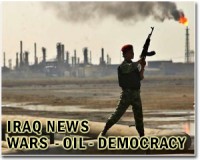 |
Baghdad (UPI) Apr 11, 2011 The recent murder of an Iraqi surgeon and a university researcher indicates that insurgents are again assassinating scientists, doctors and academics, even as those who survived an earlier wave of attacks are starting to return from exile to help rebuild their country. Zaid Abdul Munim, head of research of the molecular department at al-Mustansiriya University in Baghdad was fatally wounded by a bomb that exploded under his car April 3. Mohammed Alwan, a leading surgeon and the dean of the faculty of medicine at the same university, was assassinated March 29. They were among a dozen Iraqi academics, journalists, scientists and other prominent professional men who have been murdered in recent months. Few had any known political affiliations and apparently were killed by sectarian death squads or insurgents, possibly backed by Iran which seeks to absorb Iraq, its historic enemy, into its ideological and political orbit as U.S. forces move towards completion of a withdrawal scheduled for the end of the year. This has caused alarm in Iraq's professional and academic circles because the Shiite-dominated government of Prime Minister Nouri al-Maliki doesn't appear to be able to provide security. "A government that cannot protect its people does not deserve to be a government," complained Hikmat Jalal, head of the International Society of Iraqi Scientists and currently a professor of medicine at Wayne State University in Michigan. Hundreds of scientists, doctors, scholars, university lecturers, artists, lawyer and others fled Iraq in 2004-08 amid the systematic slaughter of the country's leading intellectuals by killer gangs, including Islamist fanatics, who appeared determined to kill them or drive them into exile. In early 2008, the Health Ministry said 628 medical personnel had been killed since 2003. The Iraqi Physicians Union said more than 500 leading medical figures had been assassinated and more than 7,000 forced to flee abroad. Before the 2003 U.S.-led invasion that toppled Saddam Hussein, Iraq, despite his brutal regime, was famed for its universities and its healthcare system. But that all vanished amid the orgy of killings and the climate of fear it engendered among Iraq's elite. Mustansiriya University, one of Iraq's most prestigious seats of learning, has figured prominently in these attacks. In October 2009, Maliki, a former student there, closed the university for a time in a bid to rid it of a shadowy gang of Shiite students who allegedly murdered, tortured, beat up and raped fellow students and killed professors and administrators. The closure of the university, which at the time has 24,000 students, followed the pistol whipping of Abdullah al-Bayati, a 63-year-old education professor, on the campus by the group known as the Students League. He had publicly criticized the group, which acted with near impunity on the campus, controlling activities and security and even grading and admissions. Since 2007, more than 325 students and staff members at Mustansiriya were killed or maimed. University officials said it was widely believed that Maliki's Shiite party, ad-Dawa, had links with the Students League. Among the casualties were Jasim al-Fahaidawi, a professor of Arabic literature, shot dead on the campus in 2005. Psychology professor Najib al-Salihi was kidnapped near the campus in 2006 and found shot to death in the morgue three weeks later. Jassim Fiadh al-Shammari, another psychology professor, was fatally shot near the university, also in 2006. In one of the grisliest attacks on academia, a female suicide bomber detonated a vest packed with explosives and ball bearings at the entrance to Mustansiriya's College of Business Administration and Economics in eastern Baghdad Feb. 25, 2007. Forty-two people were killed, most of them female students waiting to take midterm examinations. Five weeks earlier, 70 students were killed Jan. 16 when two car bombs exploded almost simultaneously near the main campus. It was one of the deadliest attacks on academia since the insurgency began following the 2003 invasion. By late 2009, with security might tighter after U.S. forces mounted a surge offensive against the insurgents and sectarian militias, some Iraqi doctors and other professionals began to trickle back from Jordan and Syria and other countries to which they had fled in droves. The government even decreed that doctors could legally carry guns to defend themselves. By June an estimated 600 doctors had returned. Now the terror has started again.
Share This Article With Planet Earth
Related Links Iraq: The first technology war of the 21st century
 Bombs kill seven in Iraq, wound 36
Bombs kill seven in Iraq, wound 36Baghdad (AFP) April 11, 2011 A bomb attack in Baghdad and three in Fallujah west of the Iraqi capital killed seven people on Monday, including four policemen, an interior ministry official said. He said the attacks also wounded 36 people. "There were three incidents in Fallujah, killing four policemen and wounding 25 people," the official said. He said one was a car bomb, and the other two improvised bombs. ... read more |
|
| The content herein, unless otherwise known to be public domain, are Copyright 1995-2010 - SpaceDaily. AFP and UPI Wire Stories are copyright Agence France-Presse and United Press International. ESA Portal Reports are copyright European Space Agency. All NASA sourced material is public domain. Additional copyrights may apply in whole or part to other bona fide parties. Advertising does not imply endorsement,agreement or approval of any opinions, statements or information provided by SpaceDaily on any Web page published or hosted by SpaceDaily. Privacy Statement |